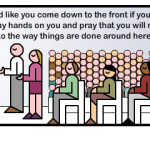We run our website the way we wished the whole internet worked: we provide high quality original content with no ads. We are funded solely by your direct support. Please consider supporting this project.

McChurch
In the West, we tend to think of church as a weekend gathering in a special religious building. As a result, many mistakenly assume that Paul wrote his letters to a single body of people in a specific town who gathered together as a rather large group once a week. In reality, the regional churches Paul wrote to consisted of a number of smaller groups who usually met in each other’s homes. We know from archeology that homes of this period rarely could accommodate more than a couple dozen people, which means that the house churches early Christians gathered in had to remain quite small.
This isn’t to say early Christians saw anything wrong with large group gatherings, such as the kind Jesus attracted. When possible, Christians throughout a region gathered together for fellowship and worship (Ac 1:13-15, 2:46, 5:12). Yet, the primary unit of the early Kingdom revolution were small house churches. This was a place where folks were in intimate relationships with fellow Christians, and they were discipled in the Kingdom way. You would have attended one of these house churches because that’s where you lived, and if conflict or disagreements arose, you would have had to work through that conflict because there was really no other choice.
Today, the experience of church is quite different for most Christians. Once a week we go to church at a religious building to consume a religious product instead of actively participating. We don’t necessarily know anyone in a deep way. As good consumers, we typically choose our church based on individual preferences, convenience, and felt-needs. If a church fails to please us or if conflict arises, we simply shop for another church. And since there are only so many religious consumers to go around, churches feel the need to compete with each other to acquire and keep as many of those consumers as possible.
We might call this McChurch, a place where you get served up a Gospel suited to your personal tastes and preferences. Anything that might be challenging or cause discomfort tends to be placed on the back burner or ignored altogether to avoid upsetting and possibly losing the consumer. This stands in sharp contrast to what it meant to be a part of a church in the New Testament.
With a McChurch mentality, those leading the church might fail to confront the idols and pagan values of Western culture, and those who attend expect that those idols and pagan values will be left alone. In fact, people don’t even recognize that those values are pagan in nature because the church actually “Christianizes” them. The things that Jesus challenged, the church often promotes. I’ll give you a couple examples.
- When was the last time you heard a sermon confronting greed as Jesus did? (Matt. 6:19-21) This is routinely glossed over in today’s churches. Instead we are often told that following Jesus will result in prosperity, and that blessings can be measured by the number and quality of your possessions.
- Think about how little we hear the teaching that God calls us to love and serve our enemies (Matt. 5:43-48). Such messages might make us uncomfortable. Instead, we hear that God is on the side of our nation and we applaud the bombing of our enemies.
In the New Testament, the church is often referred to as the “body of Christ.” Jesus acquired an ordinary body when he was born in Bethlehem, and now he has acquired a collective body called the church. We are his hands, mouth, and feet operating in the world today. The same life that was in Christ, his first body, is in us, his corporate body. This means we take our marching orders from “the head of the church,” rather than developing strategies that will keep spiritual consumers happy and satisfied.
Photo credit: Bart Heird via VisualHunt / CC BY-NC-ND
Category: General
Tags: Church, Consumerism, Discipleship
Topics: The Church
Related Reading

A Cross-Like Church
When God’s church loves like God loves—which means valuing the other at cost to self—it will puzzle those outside the church. While such love might cause the religious to rail with outrage, it will cause the searching and the hungry to ask, “how can people love like this?” In God’s plan, this puzzle is what…

The “Kingdom Now”: Reflections on Magical American Christianity
One major problem American Christians face is that we tend to embrace a magical view of the Christian faith. We assume that if a person “prays the sinners prayer,” “surrenders their life to Christ,” and “accepts Jesus as Lord of their life,” this somehow magically “saves” them and will sooner or later magically transform them…

Podcast: How Do We Balance Both Seeking Unity While Also Confronting Error?
Greg looks at the call to unity and considers things that do not help achieve it. http://traffic.libsyn.com/askgregboyd/Episode_0421.mp3

The Case for Women in Ministry
Kathy’s Struggle with Temptation Kathy was one of the brightest students I ever had when I taught Theology at Bethel University. She asked insightful questions and often contributed to lively class discussions. The time and energy she put into her theology classes was motivated by more than just a desire to get a good grade.…

A Brief History of Political Power and the Church
The history of the church has been largely one of believers refusing to trust the way of the crucified Jesus and instead giving in to the very temptation he resisted. It’s the history of an institution that has frequently traded its holy and distinct mission for what it thought was a good mission. It is…

